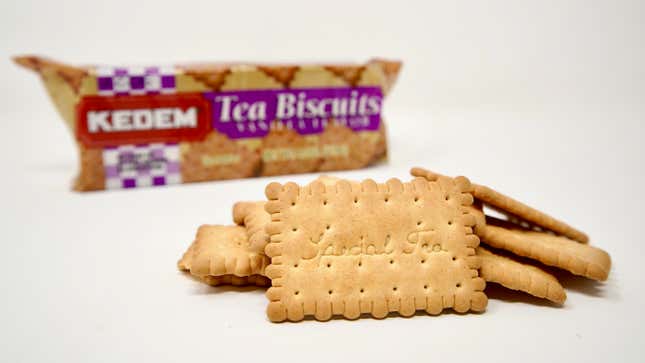
When I moved to Chicago after college, I was in my early twenties and not flush with cash. My entry-level job (in Yellow Pages advertising) wasn’t very lucrative. I shared an apartment in a building where squatters occupied the basement. To make rent, I adhered to a strict food budget of $5 a day. My diet consisted of things like breaded chicken patties, Top Ramen, and tap water.
This forced me to rationalize every purchase. The two questions I asked myself were: is it worth the cost, and will I eat all of it? Where I shopped played a role in the budget too. Aside from the corner store, all my shopping happened at the nearby international grocery store. In Chicago, an international grocery store will typically have “fresh,” “harvest,” “produce,” or “market” in it—see Fresh Farms, Cermak Produce, and HarvesTime Foods. These are great places for affordable produce and meat, as well as more uncommon brands specific to certain cultures.
On one such trip, a pack of tea biscuits caught my eye in the kosher aisle. The biggest selling point was the price for the package: 20-30 biscuits for less than a dollar. It seemed out of whack with other cookie prices, but the cost constituted a low risk. I took home a package of the “original” flavor and ate the whole thing. It passed my two-question test with flying colors, and Kedem tea biscuits remain a staple value snack I enjoy today.
Tea biscuits are a dry, semi-sweet cookie that just crosses the line from cracker into sweet thing, designed to be enjoyed with a spot of tea or whatever hot beverage you prefer. Known as “digestives” across the Atlantic, tea biscuits are believed to have tummy-settling qualities due to the inclusion of sodium bicarbonate (baking soda). Their consistency is like a graham cracker given a finish with fine-grit sandpaper. If you want the proper tea biscuit experience, find yourself some McVitie’s, the renowned British cookie (er, biscuit) brand.

Kedem, the company that produces the ridiculously economical biscuits I found, is actually a grape juice maker that distributes other kosher products under its brand name. It is Goya-esque in its product breadth; its banner appears on everything from gefilte fish to vegetable soup mix to cookies.
Kedem’s tea biscuits are plain, and I mean that as a compliment. When eaten dry, they’re the perfect consistency and flavor to serve to an ill or finicky child. I’m speaking from experience, as all three of my kids like them—even my 20-month-old son, who, convinced they’re crackers, calls for them by his anointed name of “gah guh.” They appreciate that there’s enough cookie sweetness for the biscuits to be considered a treat, while I find that without the added dyes or frostings, there’s less parental guilt doling out several at once.
Despite their firm and smooth texture, they don’t hold their form for long when steeped in a hot liquid. A “one-Mississippi” dunk is enough to keep the cookie from disintegrating and pick up hints of whatever you’re drinking along with it, while four Mississippis reduce the biscuit to mush.
I’ve tried every flavor, and I recommend the chocolate and original. The orange and vanilla varieties taste pretty much like the original, whereas the chocolate flavor is more chocolatey without being any more or less sweet.
But back to the reason for buying them in the first place. To reiterate: at anywhere from 80 to 99 cents, man, these are cheap. One pack of 20-30 tea biscuits is one-third the cost of a package of around the same amount of Oreos (around $3.50), or one-fifth of a sleeve of 15-20 larger McVitie’s biscuits stateside (usually north of $4). A miniature vending machine pack of six cookies costs more than a full package of Kedem biscuits.
Once you’ve had to scrimp for food, it’s a hard habit to break. Heck, I still eat Top Ramen occasionally for weekend lunches. And when I consider that the satisfaction of eating bulkier, fancier cookies as part of my everyday routine is only marginally higher than the satisfaction of dunking Kedem in my tea, I’m happy to stick to these biscuits and deploy that extra buck or two where it’ll really make a difference.